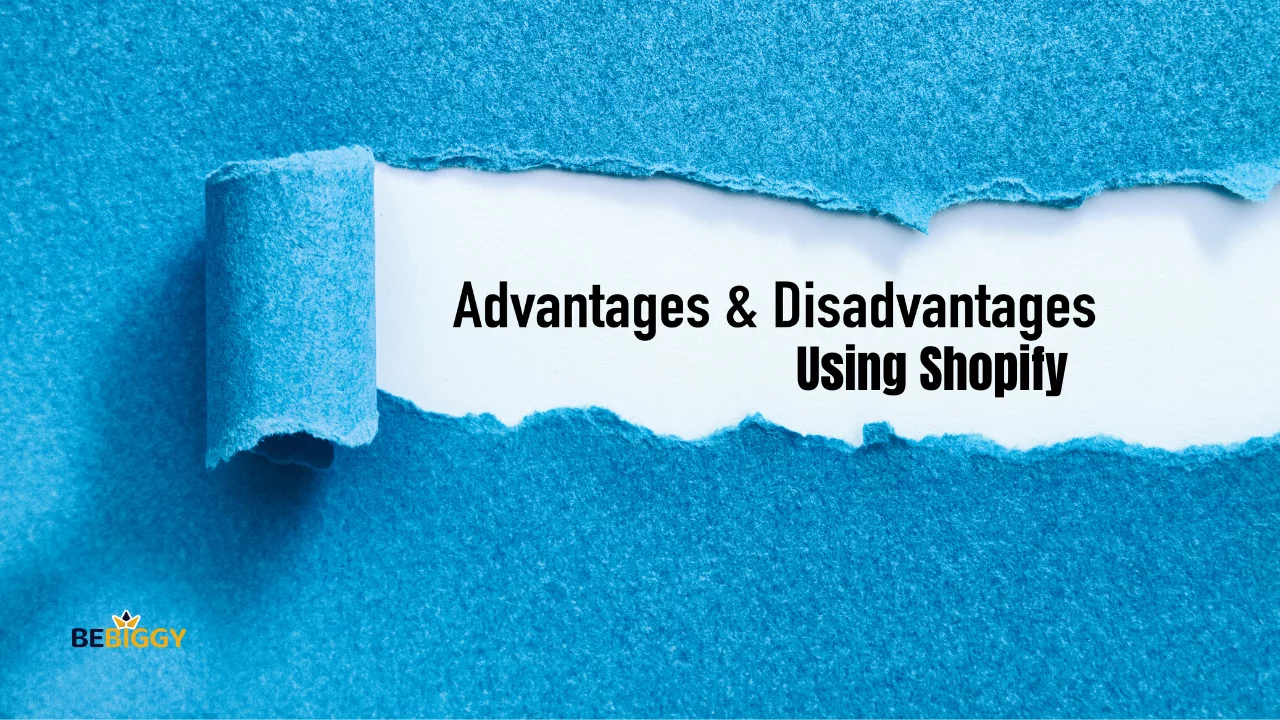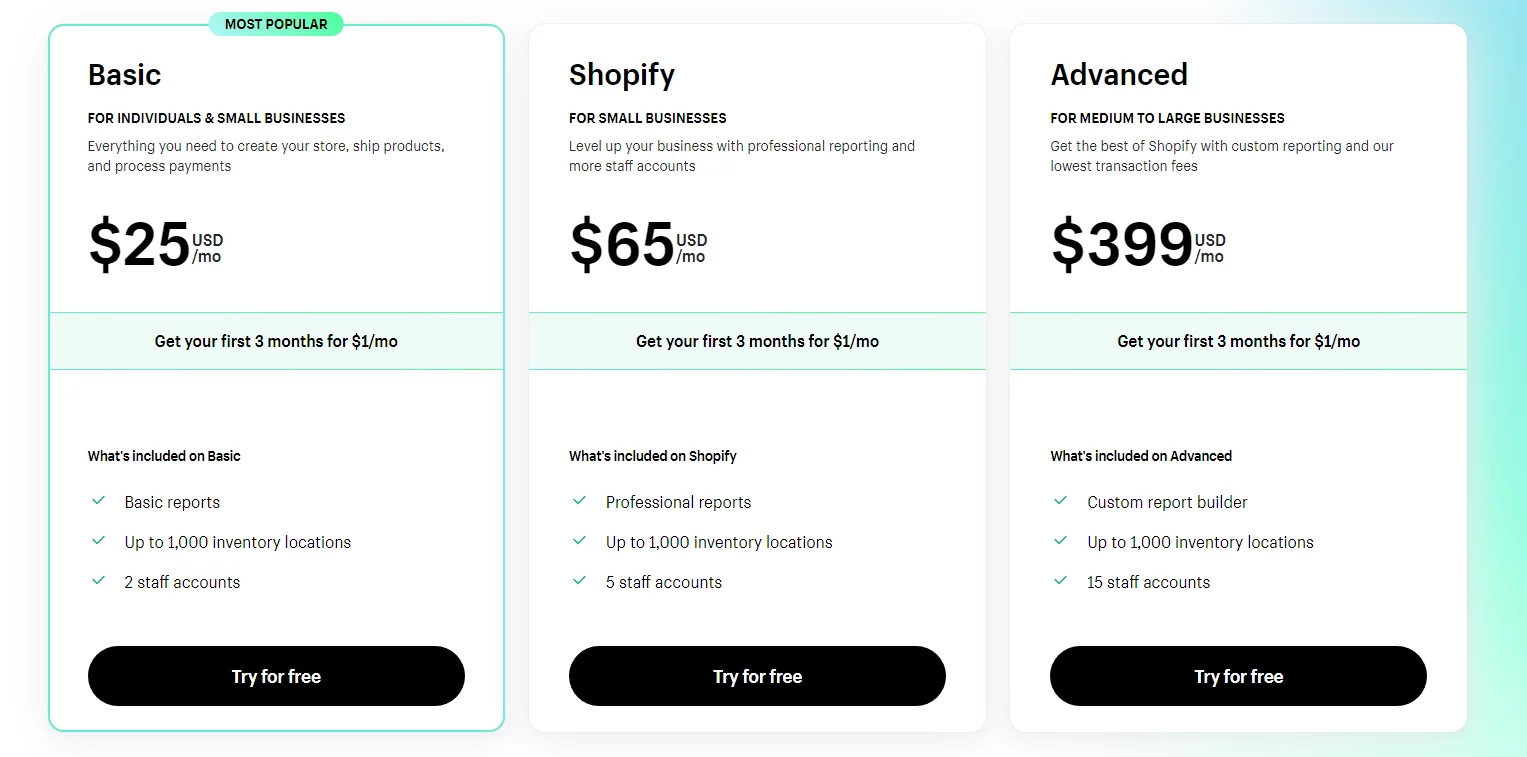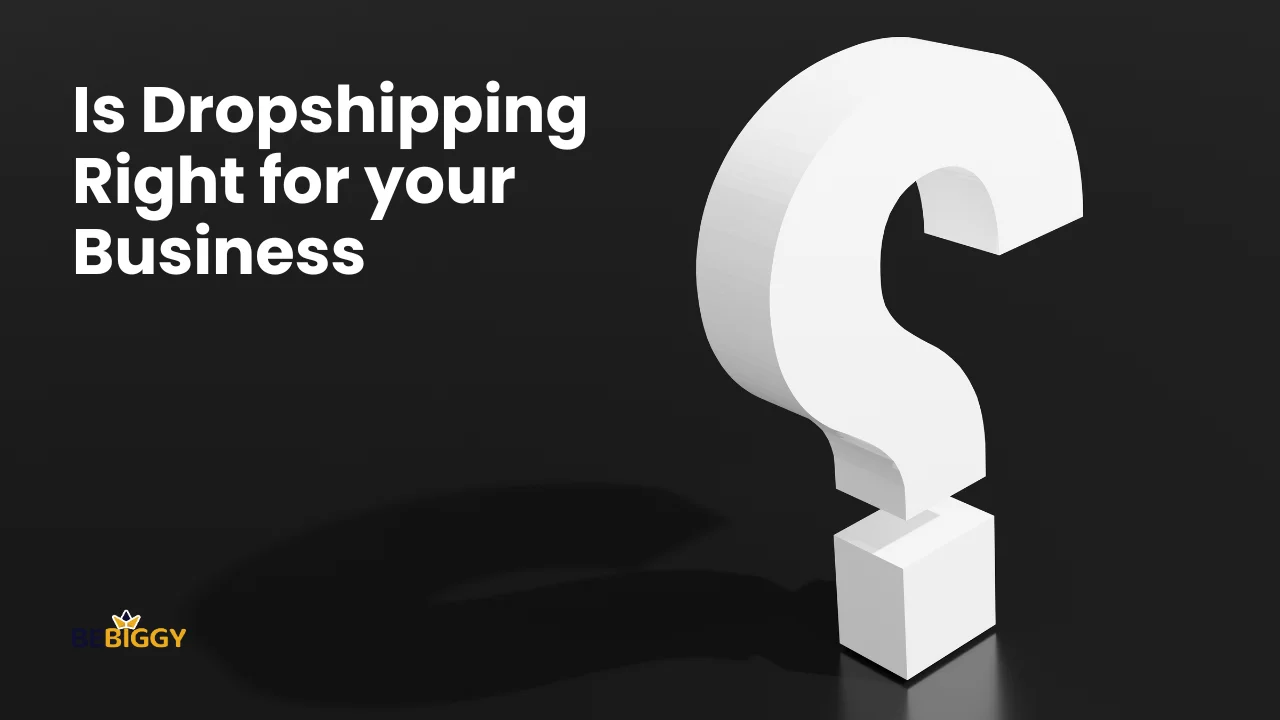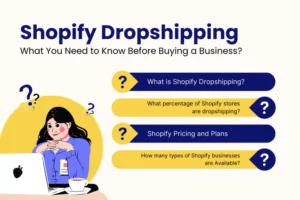Anticipated Shopify dropshipping pros and cons in 2024: What Lies Ahead!
Whether you’re an experienced entrepreneur or just dipping your toes into online retail, Shopify is here to make your dreams come true. We’ll unravel the enchanting story of Shopify, the platform that turns anyone into an e-commerce wizard, regardless of your tech expertise.
From building your dream online store to effortless inventory management and secure payment processing, Shopify has got you covered.
Join us as we explore the captivating world of e-commerce and discover how Shopify can transform your business. It’s time to unleash the power of your online store.
What is Shopify?
Shopify is like the magic wand of e-commerce. This all-encompassing platform allows you to build and run your online store without being a tech whiz. Shopify makes it easier to sell products online, regardless of your experience as a business owner. It offers a toolbox with features that let you customize your digital storefront, display your products, securely process payments, and even manage your inventory.
How Shopify operates
Shopify simplifies e-commerce.
- First, you create your online store, customizing it with your brand’s look and feel.
- Next, Shopify ensures secure payment processing, making it easy for customers to buy. You can monitor inventory effortlessly and tap into analytics to understand your business better.
- Plus, you can attract and serve customers effectively with marketing tools and a vast app ecosystem. In a nutshell, Shopify streamlines the process of setting up, managing, and growing an online store.
Major components of Shopify
It offers product management, payments, marketing, and customer support features, making it a versatile choice for many online businesses. Shopify’s emphasis on providing a seamless and secure shopping experience for merchants and customers has contributed to its widespread popularity in the e-commerce industry.
Expanding your business using Shopify
Shopify is revered for its user-friendly approach, streamlining the process of establishing and managing online stores, which appeals to users with diverse technical backgrounds. However, while Shopify provides a seamless e-commerce experience, it’s essential to carefully evaluate your unique needs and scalability requirements when considering it as a solution for your online business.
Shopify – Your E-Commerce Solution
Shopify is the perfect e-commerce platform for all businesses. It offers an intuitive, user-friendly interface, empowering small business owners to manage their online stores effortlessly. With pre-designed templates, mobile responsiveness, and various payment options, Shopify provides everything you need to succeed in the digital marketplace.
You can start small and scale up as your business grows, and the extensive App Store offers tools for enhancing your store’s functionality. Plus, Shopify’s SEO features ensure your business attracts the right customers. With top-notch security and 24/7 support, Shopify is the ideal partner for small businesses embarking on their e-commerce journey.
Reasons to consider dropshipping exclusively through Shopify:

- User-Friendly Platform: Shopify is well-known for its user-friendly interface, which makes it simple for newcomers without substantial technical skills to set up and maintain a dropshipping store.
- E-commerce Focus: Shopify is specifically designed for e-commerce, providing a range of e-commerce features and tools to streamline the dropshipping process.
- Integrated Solutions: It offers an all-in-one solution, including hosting, security, and payment processing, simplifying the setup of your dropshipping business.
- Extensive App Ecosystem: The Shopify App Store offers a wide selection of dropshipping apps and integrations that can enhance and automate various aspects of your business.
- Mobile Responsiveness: Shopify themes are mobile responsive, ensuring a seamless shopping experience for customers.
- Professional Design: Shopify’s themes are designed to give your store a professional and polished look, which is crucial for building customer trust.
- Payment Gateway Integration: Shopify integrates with numerous payment gateways, making it easy to accept various payment methods enhancing the customer experience.
- Inventory Management: Inventory tracking and order management tools are available to help you keep track of your products and orders.
- Customer Support: Shopify offers reliable customer support, assisting when you encounter issues.
- Scalability: Shopify allows you to scale your dropshipping business as it grows, with the option to add more products and features.
Ultimately, using Shopify for dropshipping provides a comprehensive and user-friendly platform dedicated to e-commerce, making it an attractive choice for entrepreneurs looking to enter the dropshipping business without the complexities of managing all aspects of an online store.
Advantages and Disadvantages of Using Shopify

Here are the advantages and disadvantages of using Shopify:
Pros of Shopify:
- User-Friendly: Shopify is known for its friendly interface and ease of use. You can be something other than a technical expert to set up your online store.
- Hosting Included: Shopify is a hosted solution, so it takes care of hosting, server maintenance, and security, allowing you to focus on your business.
- Mobile Responsiveness: Shopify provides mobile-responsive themes, ensuring your store looks good and functions well on various devices.
- App Store: Shopify has a vast app store with thousands of apps and integrations. You can add functionality to your store, including marketing, SEO, and dropshipping apps.
- Payment Options: Shopify offers payment gateways, and it has its payment solution, Shopify Payments, which can save you on transaction fees.
- Scalability: Start with a small store and quickly scale up as your business grows.
- 24/7 Support: Shopify offers customer support around the clock, so you can get assistance when needed.
- SEO-Friendly: Shopify is built with SEO best practices in mind, and it provides tools and features to help you optimize your store.
- Security: Shopify is committed to protection and provides SSL certificates, secure payment processing, and regular updates to protect your store and customer data.
Cons of Shopify:
- Cost: While Shopify offers pricing plans for various budgets, there are ongoing monthly fees, transaction fees (unless you use Shopify Payments), and additional costs for apps and themes. This can add up.
- Less Customization: While you can customize your store’s design and functionality, Shopify has limitations compared to platforms like WooCommerce in terms of deep customization.
- Transaction Fees: If you don’t use Shopify Payments and use another payment gateway, you’ll incur transaction fees, which can impact your profitability.
- Platform Lock-In: Shopify is a closed platform, so you’re somewhat locked into their ecosystem. Migrating to a different medium can be complex.
- Limited Blogging Capabilities: If content marketing and blogging are significant for your business, Shopify’s features are somewhat basic compared to dedicated blogging platforms like WordPress.
- Subscription Dependency: You must keep paying the monthly subscription fee to maintain your Shopify store. If you stop paying, your store goes offline.
- Multilingual Support: While you can make your store multilingual, it requires workarounds and potentially additional costs.
Shopify is an excellent e-commerce platform, especially for entrepreneurs and small businesses. Its ease of use, robust features, and support make it a top choice for many. However, there may be more cost-effective solutions for some businesses, and its level of customization might not meet the needs of those who require highly specialized features or designs.
Plans available on Shopify

Basic Plan
This plan is designed for small businesses and startups. It includes essential features to set up and run an online store. Pricing starts at $25/mo.
Shopify Plan
The standard Shopify plan offers additional features and capabilities, including gift cards, professional reports, and abandoned cart recovery. It’s suitable for businesses looking to grow. Pricing starts at USD 65/mo.
Advanced Shopify:
This plan is tailored for businesses that require advanced features, such as advanced report building. It’s priced at $399/mo.
Shopify Plus:
Shopify Plus is a premium enterprise-level solution designed for high-volume and large businesses. Pricing for this plan is negotiated individually and offers a highly customizable and scalable platform. It’s priced at $2,000/mo or variable for higher volume business.
It’s important to note that while creating an account on Shopify is free, ongoing expenses like subscription plans, transaction fees, and additional services will be necessary as you build and grow your online store. Make sure to budget accordingly based on your business goals and needs.
How do you set up a Shopify store for dropshipping?
To set up a Shopify store for dropshipping:
- Sign up for Shopify and choose a plan.
- Customize your store’s design and branding.
- Install a dropshipping app like DSers or Spocket to source products.
- Add products to your store from your chosen suppliers.
- Set up secure payment processing for transactions.
- Launch your store and start marketing to attract customers.
Is dropshipping right for your business?

Whether dropshipping is the right approach for your business depends on various factors, and it’s essential to evaluate your specific circumstances and goals carefully. However, it comes with competition-related challenges, profit margins, and reliance on suppliers. It’s crucial to conduct thorough market research, choose reliable suppliers, and have a clear business strategy to succeed in the dropshipping industry. Your specific goals, resources, and willingness to navigate these challenges will determine whether dropshipping fits your business.
Trends and Factors influence the future of Shopify
The end of Shopify dropshipping is subject to several trends and factors likely to affect its trajectory. While I don’t have access to future data, here are some insights into potential developments in the world of Shopify dropshipping:
Evolving E-commerce Landscape: The e-commerce industry is dynamic, and consumer behavior continues to change. Shopify dropshippers must adapt to shifting trends, emerging markets, and technological advancements to remain competitive.
Enhanced Automation: Automation tools and AI-driven solutions will likely play an increasingly prominent role in dropshipping, streamlining processes like product sourcing, order fulfillment, and customer support.
Sustainable and Ethical Practices: Consumers are increasingly conscious of sustainability and ethical sourcing. Shopify dropshippers may consider offering eco-friendly products and transparent supply chains to meet these demands.
Brand Building: Building a solid brand and creating a unique value proposition will become critical in a competitive dropshipping landscape. Successful dropshippers may focus on branding, customer experience, and niche markets.
Regulatory Changes: Ongoing changes in e-commerce regulations, taxes, and import/export rules can impact dropshipping operations. Staying informed and compliant with evolving laws is crucial.
Diversification: Successful dropshippers may look to diversify their revenue streams by offering a mix of dropshipped products, private-label products, or other business models within the e-commerce ecosystem.
Quality and Customer Service: As competition increases, providing exceptional customer service and high-quality products will be essential for building trust and customer loyalty.
International Expansion: Expanding into new global markets can be a growth opportunity for Shopify dropshippers. Adapting to local preferences and regulations will be necessary.
Multichannel Selling: Besides the online store, Shopify dropshippers may explore selling on multiple platforms, such as Amazon, eBay, and social media, to reach a broader audience.
Data Analytics: Leveraging data analytics to make informed decisions about product selection, marketing strategies, and customer preferences will become increasingly important.
The future of Shopify dropshipping will depend on the ability of dropshippers to adapt to these trends, make informed strategic choices, and provide value to their customers in an ever-evolving e-commerce landscape. Staying knowledgeable about industry developments and consumer behavior will be crucial to success.
Is it anticipated that Shopify will achieve profitability in 2024?

Shopify has experienced significant growth in the e-commerce industry, and its financial performance has generally been positive in the years leading up to 2023. However, it’s important to note that the financial performance of any company can fluctuate due to various factors, including market conditions and economic changes. Market predictions can vary, but the dropshipping industry will continue growing in 2024. E-commerce trends and consumer behavior drive demand for online shopping, which benefits dropshippers.
A company’s profitability depends on various factors
- Market conditions
- Competition
- Management decisions
- Economic trends
FAQ for Shopify Dropshipping Pros and Cons: What to Expect in 2024

Is dropshipping worth it?
Dropshipping can be a viable business model if you’re looking for a low-cost entry into e-commerce. It has the potential to be profitable, but success depends on factors like niche selection, product quality, marketing, and customer service. It can be worth it with careful planning and execution.
What is the dropshipping market prediction for 2024?
Market predictions can vary, but the dropshipping industry will continue growing in 2024. E-commerce trends and consumer behavior drive demand for online shopping, which benefits dropshippers. To get precise predictions, it’s recommended to consult industry reports and experts closer to the target year.
Is dropshipping a significant risk?
Dropshipping does come with risks, including supplier issues, quality control challenges, and competitive pressures. It also involves less control over inventory.
How secure is Shopify?
Shopify is known for its strong commitment to security. It offers secure hosting, regular software updates, and compliance with industry standards. They also provide security features like SSL certificates for data encryption and have a dedicated team monitoring potential threats.
Is Shopify safe for dropshipping?
Yes, Shopify is considered safe for dropshipping. It’s a reputable e-commerce platform that provides tools for managing dropshipping businesses. However, success depends on your choice of suppliers, product quality, and business strategies.
Why do so many Shopify stores fail?
Many factors contribute to the failure of Shopify stores, including poor market research, inadequate marketing efforts, weak branding, low-quality products, subpar customer service, and lack of business strategy. Successful Shopify stores typically invest in thorough planning and consistent effort in these areas to avoid failure.
Conclusion
Shopify is the ultimate game-changer for e-commerce enthusiasts. It offers a seamless, user-friendly experience that empowers newbies and seasoned entrepreneurs to conquer the online marketplace.
From dazzling design customization to secure payment processing and a treasure trove of apps, Shopify has all the spells you need to succeed in online retail.
So, if you’ve ever dreamt of running your online store, there’s no need for a magic wand—just harness the power of Shopify and watch your e-commerce dreams become a reality. With Shopify by your side, the future of your online business looks brighter than ever.









 What Is Shopify Dropshipping and How Does It Work?
What Is Shopify Dropshipping and How Does It Work?  Shopify Dropshipping: What You Need to Know Before Buying a Business?
Shopify Dropshipping: What You Need to Know Before Buying a Business?  How to Dropship on Shopify: Step-by-Step Guide
How to Dropship on Shopify: Step-by-Step Guide  Guide to Finding Reliable Shopify Dropshipping Suppliers [100% Success]
Guide to Finding Reliable Shopify Dropshipping Suppliers [100% Success]